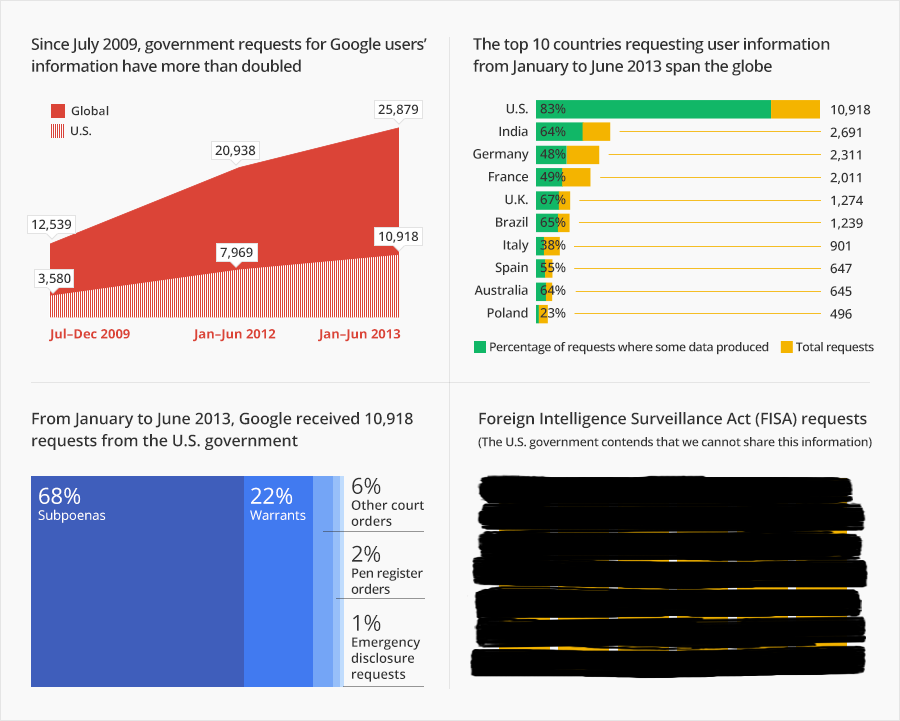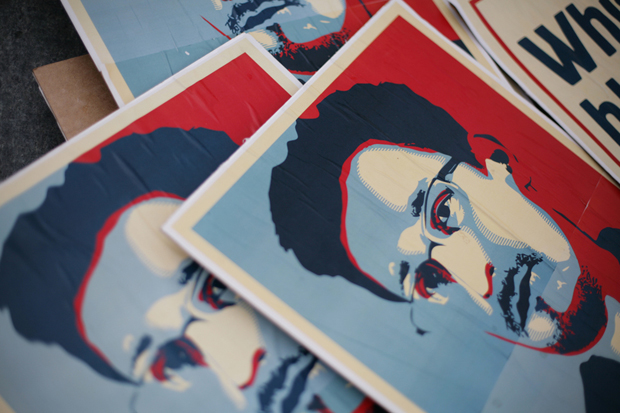14 Nov 2013 | Digital Freedom, News and features
Google has today released its transparency report for the first half of 2013. There are some interesting figures on government requests for user data in the report. The US leads the way, with 10,918 requests for information about 21,683 accounts, including almost 7,500 requests by subpoena, and interestly, seven for wiretaps (all of which resulted in some data being handed over).
This though, is not the whole story. In a curt blog post (acoompanied by a striking, censored chart), Google’s Richard Salgado pointed out that the company is restricted in what information it can share on some US national security requests, writing:
We want to go even further. We believe it’s your right to know what kinds of requests and how many each government is making of us and other companies. However, the U.S. Department of Justice contends that U.S. law does not allow us to share information about some national security requests that we might receive. Specifically, the U.S. government argues that we cannot share information about the requests we receive (if any) under the Foreign Intelligence Surveillance Act. But you deserve to know.

Other countries in the top tier include Germany, France and the UK leading the way in requests in Europe, and emerging powers Brazil and India making up the top six. The UK saw 1,274 data requests from 1,818 accounts. Brazil had a similar number, with 1,239 requests.
Overall, requests from European governments made up over a third of the worldwide total.
Google has reacted strongly to concerns over NSA and GCHQ surveillance. At a recent meeting in London, the company’s European head of external relations Peter Barron insisted that there was no back door for snooping into Google’s data, and that the company was disgusted by the idea of authorities tapping their cables.
11 Nov 2013 | Americas, News and features

While president Cristina Fernández de Kirchner’s government took a hit during midterm elections, Argentina’s supreme court ruled her restrictions on the country’s media were constitutional. (Photo: Claudio Santisteban / Demotix)
The Argentinian supreme court recently ruled to uphold the country’s controversial media law. The decision represents a big victory for President Cristina Fernández de Kirchner, who argued that the law helps break up the power concentrated in the hands of Argentina’s biggest media conglomerate Grupo Clarín. Opponents, however, says it stifles freedom of expression and press as it would force media companies to sell off some of their outlets. Concerns have also been raised about the law being a way of punishing Clarín, which fell out with the government after negative coverage during tax protests in 2008.
This is only the latest chapter in the ongoing story of the media business in some Latin American countries, with left wing governments and private companies locked in a decade-long fight for control of what will be shown on TV, heard on the radio, printed in newspapers, and posted on websites. New communications laws, persecution of journalists and closure of television networks, however, shows who is really in charge.
Governments like Venezuela and Argentina are waging war against big media companies, while more moderate ones, like Brazil, are using milder means to try and balance the power of communication in their countries. But far from being presented as a straightforward issue of freedom of expression, most of these cases have two opposing and radical interpretations.
On one side, there is the pro-government camp. They believe the governments are democratising the media, which has traditionally been in the hands of the few. In Brazil, for example, eight families control almost 80% of all traditional media companies. The aforementioned Grupo Clarín owns national and regional newspapers, radios, TV channels and more.
Those opposing these measures, however, say they amount to censorship. Again, a good example comes from Argentina: there are some rumours that Kirchner’s administration is trying to suffocate Grupo Clarín by not allowing big chain stores to advertise in their papers. There is also the infamous case of the the closure of Venezuela TV channel RCTVI in 2010.
Both sides talk of freedom of expression, arguing they want to show what is better for the public. But the public – those with the most to benefit from a good and transparent media – are not being allowed to decide for themselves. This is not happening just in Argentina and Venezuela, but across the continent – in Ecuador, Nicaragua and Bolivia, and, albeit in a much gentler way, in Brazil.
Professor Mirta Varela, specialist in history of the media at the University of Buenos Aires, is among those who believe governments are not repressing the big companies or trying to dominate the industry. “The measures taken have shown the political and economic power of the main companies, the spurious origin of their economic growth and their relationship with the dictatorship”, she explains, referencing Grupo Clarín and the military regimes that held power in almost all the Latin American countries from 1960 to 1980. But she also sees some problems with this polarisation: “There is a little room to set a new agenda; to make independent criticism, not overtly for or against the government.”
Cecilia Sanz works for Argentinian TV show “Bajada de línea”, which roughly translates to “Under the Line”. The show is hosted by Uruguayan Victor Hugo Morales, a well-known journalist connected to what Sanz calls “the progressive governments” in Latin America. Here she groups together a number of different left-leaning governments from across the continent – from moderates Lula da Silva and Dilma Rousseff in Brazil, to the more radical Evo Morales in Bolivia and Rafael Correa in Ecuador.
The show comments on the state of the media in Latin America, mainly arguing against the big private companies. “Our main goal is to put in context and show how the media owners have the intention, above all else, to accomplish their economic objectives,” she says. “The are using ‘freedom of expression’ as an excuse for this”. She mentions the case of powerful Mexican TV Azteca, which according to her, supports all the candidates from the hegemonic party PRI, and Chilean paper “El Mercurio”, which used to attack Chilean ex-president Salvador Allende in the 1970s – again putting very different cases in the same group.
The more radical of these “progressive governments” accuse the media industry of trying to destabilise the authorities or to encourage coups d’état. Venezuela’s putsch in 2002 is always mentioned. In this case factions of the media was directly fighting against Hugo Chávez – so Chávez took them off the air.
“This is an insult to the audience because in all of cases it is about the most popular media channels”, counters Claudio Paolillo, president of the freedom of press and expression commission of SIP, Sociedad Interamericana de Prensa (the Inter-American Press Society). “No one has put a gun to the audience’s head to force them to choose what to read, listen or watch, and on what channel.”
Paolillo says the government engages in “Goebbels’ style” propaganda, sustained by public resources, to oppress independent or critic media and journalists. He adds that, ironically, these radical “progressive governments” act like the conservative military regimes of the past. “It is an ideological posture. They want to nationalise communications media as if it was a regular business that offers services or products.”
Paolillo says SIP is against Latin Americas state-controlled monopolies or oligopolies, but reaffirms it is the audience that has the real power to decide what to watch, and where. If they want to watch the same news program, the government shall not interfere. “Unfortunately in Argentina as in Venezuela (and we must add here Ecuador, Nicaragua and Bolivia), governments have created their own media companies, expropriated and bought private ones – in some cases even working through a figurehead”, he complains.
Brazilian political scientist Mauricio Santoro brings up another common problem in the region – organised crime targeting reporters in Mexico and Colombia. But he says this is not a new situation. In his opinion, what is new, is “progressive governments” using the power of the state to control its opponents.
“The alternative proposed by these leftist governments is not based on the construction of an alternative model that privileges pluralism and gives a voice to social and community movements. It is about breaking business groups and giving power to a state press that acts like a government representative and not a public one.”
Worried about the poor quality of the media across Latin America, Santoro suggests the continent needs a more dynamic media, more capable of listening and understanding the true necessities of the people of a region going through “profound change”.
“Looking at the local scene”, he asks, “are we able to find any country where the traditional media meets this expectation?”
Not really.
This article was originally posted on 11 Nov 2013 at indexoncensorship.org
8 Nov 2013 | Digital Freedom, News and features, United Kingdom

(Photo: David von Blohn / Demotix)
This week saw some movement in the debate over NSA and GCHQ surveillance, and a court case that could have very serious consequences.
The court case first. One Wednesday and Thursday, the court of Appeal held a judicial review into the use of Schedule 7 of the Terrorism Act taken by David Miranda, partner of journalist Glenn Greenwald. Miranda was detained in transit at Heathrow airport under Schedule 7 while carrying encrypted documents that had emanated, ultimately, from whistleblower Edward Snowden.
The question was whether the authorities, knowing who Miranda was, what he was likely to be carrying, and his purpose for holding the documents, had a right to detain him under that particular piece of law.
It’s quite technical, but it comes down to whether carrying the documents Miranda was carrying could be seen as an act of terrorism or an act that could potentially aid terrorism (as the government and police argue) or as part of a journalistic enterprise (in essence, what Miranda is arguing).
Index and other organisations have weighed in in support of the argument put forward by Miranda’s team, as we worry that a ruling against Miranda could have serious implications. Journalism can often operate in dubious areas: whether material “leaked” or “stolen” for example, is a question that can have very different answers depending on who you ask.
In this case, the UK government very clearly maintains that the documents have been stolen and should be given back. Furthermore, they believe that they could fall into the hands of the wrong people – terrorists or hostile states, if not in the control of security services.
That, by the way, was very interesting indeed. The Home Office’s case suggested Russia, where Edward Snowden has been granted temporary asylum, is a hostile state.
The other side of this argument is that Miranda was assisting in journalism. This will involve, on occasion, having documents others would rather you did not have. The act of journalism is to sift these documents and decide where the stories lie within them. There was considerable back and forth on what “responsible journalism” constitutes during the hearing, but ultimately, it must be up to an editor what goes into a paper.
The Guardian’s Alan Rusbridger maintains he has acted with absolute responsibility. And GCHQ have as yet not claimed that agents have been endangered as a result of the Guardian’s revelations.
But at a hearing of parliament’s Intelligence and Security Committee (the ISC) on Thursday, spy chiefs insisted that Britain’s enemies were “rubbing their hands with glee” at the Guardian’s publications, and that terrorist chatter online had “gone dark” (i.e. more difficult to trace) since the first stories had appeared.
What next for the surveillance debate? The ISC performance was generally held to be weak. Rory Stewart MP has suggested it be composed more democratically, with an opposition MP at its head. The general demand on surveillance seems fairly low key: more scrutiny, less scope for random snooping.
Meanwhile the judges will mull over the Miranda case, and, we hope, come to the conclusion that whatever the young Brazilian was doing, it wasn’t terrorism.
This article was originally posted on 8 Nov 2013 at indexoncensorship.org
4 Nov 2013 | Digital Freedom, News and features

We can partially blame gerrymandering for the current gridlock in the U.S. Congress. By shaping the electoral map to create politically safe spaces, we have generated a fractious body that often clashes rather than collaborates, limiting our chances of resolving the country’s toughest challenges. Unfortunately, revelations about the global reach of American security surveillance programs under the National Security Agency (NSA) are leading some to propose what amounts to gerrymandering for the internet in order to route around NSA spying. This will shackle the internet, inherently change its technical infrastructure, throttle innovation, and likely lead to far more dangerous privacy violations around the globe.
Nations are rightly upset that the communications of their citizens are swept up in the National Security Agency’s pervasive surveillance dragnet. There is no question the United States has overreached and violated human rights in its collection of communications information on innocent people around the globe; however, the solution to this problem should not, and truly cannot, be data localization mandates that restrict data storage and flow.
The calls for greater localization of data are not new, but the recent efforts of Brazil’s President, Dilma Rouseff, to protect Brazilians from NSA spying reflected the view of many countries suddenly faced with a new threat to the privacy of the communications of their citizens. Rouseff has been an advocate for internet freedom, so undoubtedly her proposal is well intentioned, though the potential unintended repercussions are alarming.
First, it’s important to consider the technical reasons why data location requirements are a really bad idea. The Internet developed in a widely organic manner, creating a network that allowed data to flow from all corners of the world – regardless of political boundaries, residing everywhere and nowhere at the same time. This has helped increase the resilience of the internet and it has promoted significant efficiencies in data flow. As is, the network routes around damage, and data can be wherever it best makes sense and take an optimal route for delivery.
Data localization mandates would turn the internet on its head. Instead of a unified internet, we would have a fractured internet that may or may not work seamlessly. We would instead see districts of communications that cater to specific needs and interests – essentially we would see Internet gerrymandering at its finest. Countries and regions would develop localized regulations and rules for the internet to benefit them in theory, and would certainly aim to disadvantage competitors. The potential for serious winners and losers is huge. Certainly the hope for an internet that promotes global equality would be lost.
Data localization may only be a first step. Countries seeking to keep data out of the United States or that want to exert more control over the internet may also mandate restrictions on how data flows and how it is routed. This is not far-fetched. Countries such as Russia, the United Arab Emirates, and China have already proposed this at last year’s World Conference on International Telecommunications.
As internet traffic begins to demand more bandwidth, especially as we witness more real-time multimedia applications, efficient routing is essential to advance new internet services. High capacity applications like Apple’s FaceTime may slow to the painful crawl reminiscent of the dial-up days of the internet.
This only begins to illustrate the challenges internet innovators would face, but big established players like Facebook, Google and Microsoft, would potentially have the resources to abide by localization mandates – of course, only if the business case supports working in particular locales. Some countries with local storage rules may be bypassed altogether. For small or emerging businesses, data localization requirements would be a greater challenge. It would build barriers to markets and shut off channels for innovation. Few emerging businesses could afford to locate servers in every new market, and if local data server requirements become ubiquitous, it will be businesses in emerging markets that are most disadvantaged. The reality for developing nations is that protectionist measures such as data localization will further isolate local business from the global market, depriving them of the advantages for growth that are provided by the borderless internet.
Most important though, is the potential for fundamental harm to human rights due to data localization mandates. We recognize that this is a difficult argument to accept in the wake of the revelations about NSA surveillance, but data localization requirements are a double-edged sword. It is important to remember that human rights and civil liberties groups have long been opposed to data localization requirements because if used inappropriately, such requirements can become powerful tools of control, intimidation and oppression.
When companies were under intense criticism for turning over the data of Chinese activists to China, internet freedom activists were united in theirs calls to keep user data out of the country. When Yahoo! entered the Vietnamese market, it placed its servers out of the country in order to better protect the rights of its Vietnamese users. And the dust up between the governments of the United Arab Emirates, Saudi Arabia, India, and Indonesia, among others, demanding local servers for storage of BlackBerry messages in order to ensure legal accountability and meet national security concerns, was met with widespread condemnation. Now with democratic governments such as Brazil and some in Europe touting data localization as a response to American surveillance revelations, these oppressive regimes have new, albeit inadvertent, allies. While some countries will in fact store, use and protect data responsibly, the validation of data localization will unquestionably lead to many regimes abusing it to silence critics and spy on citizens. Beyond this, data server localization requirements are unlikely to prevent the NSA from accessing the data. U.S. companies and those with a U.S. presence will be compelled to meet NSA orders, and there appear to be NSA access points around the world.
Data localization is a proposed solution that is distracting from the important work needed to improve the Internet’s core infrastructural elements to make it more secure, resilient and accessible to all. This work includes expanding the number of routes, such as more undersea cables and fiber runs, and exchange points, so that much more of the world has convenient and fast Internet access. If less data is routed through the U.S., let it be for the right reason: that it makes the Internet stronger and more accessible for people worldwide. We also need to work to develop better Internet standards that provide usable privacy and security by default, and encourage broad adoption.
Protecting privacy rights in an era of transborder surveillance won’t be solved by ring fencing the Internet. It requires countries, including the U.S., to commit to the exceedingly tough work of coming to the negotiating table to work out agreements that set standards on surveillance practices and provide protections for the rights of privacy and free expression for people. Germany and France have just called for just such an agreement with the U.S. This is the right way forward.
In the U.S., we must reform our surveillance laws, adopt a warrant requirement for stored email and other digital data, and implement a consumer privacy law. The standards for government access to online data in all countries must likewise be raised. These measures are of course much more difficult in the short run that than data localization requirements, but they are forward-looking, long-term solutions that can advance a free and open internet that benefits us all.
Joseph Lorenzo Hall, Chief Technologist at Center for Democracy and Technology, co-authored this piece with Leslie Harris.
This article was originally posted on 4 Nov 2013 at indexoncensorship.org




